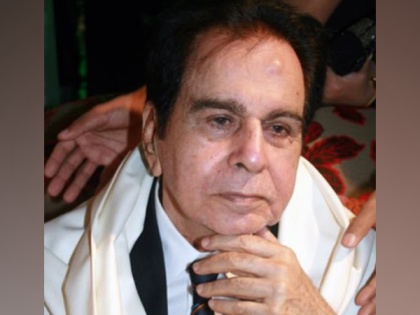Dilip Kumar's 2nd death anniversary: Saira Banu makes Insta debut, remembers Bollywood's 'Tragedy king'
By ANI | Published: July 7, 2023 10:42 PM2023-07-07T22:42:18+5:302023-07-07T22:45:25+5:30
Mumbai (Maharashtra) [India], July 7 : The legendary actor Dilip Kumar left for his heavenly abode on July 7, ...

Dilip Kumar's 2nd death anniversary: Saira Banu makes Insta debut, remembers Bollywood's 'Tragedy king'
Mumbai (Maharashtra) [India], July 7 : The legendary actor Dilip Kumar left for his heavenly abode on July 7, 2021. He passed away unexpectedly in Mumbai after a long and protracted illness. He was 98.
Dilip Kumar, known as the 'tragedy king' of Hindi cinema, has captivated audiences for over six decades with his versatile acting abilities.
No one can ever forget his charming personality and his style of dialogue delivery. His fans still repeat and remember his famous dialouges like "Kaun kambakht hai jo bardaasht karne ke liye peeta hai, main toh peeta hoon ki bas saans le sakun," "Ek kranti marega... toh hazaar kranti paida honge," "Mera dil bhi aapka koi Hindustan nahi, jispar aap hukumat karein, Haq hamesha sar jhukake nahin... sar uthake maanga jaata hai" and many more.
On his second death anniversary, Saira Banu joined Instagram and shared a touching tribute to her late husband, actor Dilip Kumar.
She dropped Kumar's favourite Urdu couplets, "Sukoon-E-Dil Ke Liye Kuch Toh Ehtemaam Karoon, Zara Nazar Jo Miley Phir Unhe Salaam Karoon, Mujhe Toh Hosh Nahin Aap Mashwara Dijiyey Kaha Se Chedoon Fasana Kahan Tamaam Karoon."
"I am writing this note on the 7th of July to especially express my gratitude to the overwhelming multitude of caring well-wishers and dearest friends from the world over who have so tremendously swept me off my feet till today with their everlasting remembrance, love, and respect for my Kohinoor Dilip Kumar Sahib," she wrote.
Recalling the loss of her 'Sahib' as she fondly called him, Saira quoted another Urdu couplet, "Uth Apni Jumbish-E-Mizgaan Se Taaza Kar De Hayaat, Keh Ruka Ruka Qadam-E-Qayenaat Hain Saqi." (My loved one is in slumber so my entire world is still- I implore him to stir awake so that the world comes alive again with his movement of waking up)
"Till this day, I feel he is with me, and no matter what, we will still walk the path of life together- hand in hand- one in our thoughts and being until the end of time. Dilip Sahib has been that iconic guiding light for my life and all those generations who have stepped forward in their lives, exemplified by his gracious presence and personality. He has been the greatest actor ever and a great human being, a true picture of humility with dignity," she wrote.
Saira concluded the post, "On 'Instagram' I would like to share his life, his thoughts and vision as also his dedication and commitments not only to the 'Film Industry' of which he has been the 'Ultimate Actor,' but various other activities towards society and well-being of the world at large."
View this post on Instagram
In 1966, he married Saira Banu and lived in Bandra, a Mumbai suburb, until his death in 2021.
Dilip, who is credited with pioneering method acting in cinema, dominated the Indian film scene from the late 1940s to the 1960s, earning the nickname Abhinay Samrat from the audience. Kumar holds the record for the most Filmfare Awards for Best Actor wins, which was later equalled by Shah Rukh Khan, who was also the award's inaugural recipient. He is also known as the "First Khan of Hindi Cinema."
He appeared in less than 60 films in a variety of roles over the course of his five-decade career. He made his acting debut in the 1944 film Jwar Bhat.
Dilip worked in various famous movies like 'Andaz' (1949), 'Daag' (1952), 'Devdas' (1955), 'Azaad' (1955), 'Naya Daur' (1957), 'Madhumati' (1958), 'Mughal-E-Azam' (1960), 'Ram Aur Shyam' (1967) and many more.
The Government of India honoured him with the Padma Bhushan in 1991 and the Padma Vibhushan in 2015 for his contributions to film. In 1994, he was also given India's highest honour in the field of cinema, the Dadasaheb Phalke Award.
Disclaimer: This post has been auto-published from an agency feed without any modifications to the text and has not been reviewed by an editor
Open in app